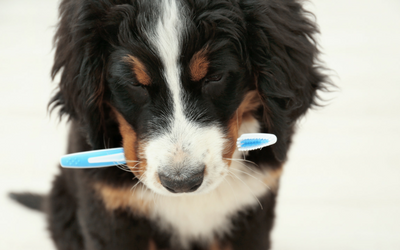
Dental care is just as important for your pet’s health as it is for yours. We include dental care as part of our routine by brushing and flossing our teeth, as well as scheduling regular appointments for dental cleanings and checkups. Just like us, your pet’s teeth need regular care too! This includes daily brushing and an exam at least once a year by your veterinarian, who will check for signs of dental disease (also known as periodontal disease).
Periodontal disease is a term used to describe the inflammation or infection of the tissues surrounding the tooth. It progresses from plaque and tartar buildup to gum recession, loose teeth, bone loss, and chronic pain. Periodontal disease is very common in pets, even though it is preventable. 70% of cats and 80% of dogs have some form of periodontal disease by the age of 3.
Dental disease can contribute to other health problems in pets including kidney, liver, and heart problems.
Because many pets do not show obvious signs of periodontal disease early on, it is important for pet owners to prevent the disease before it begins. Take a moment this month to do a quick check of your pet’s oral health and establish a daily routine.
Take a whiff. Bad breath is an early indication of dental problems in pets. If your pet has stinky breath, chances are Fido or Kitty has dental disease.
Take a peek. Have a look in your pet’s mouth for other signs of dental disease. These include red, swollen, or bleeding gums; discolored teeth; tartar buildup; and loose or broken teeth. Be careful when examining your pet’s mouth – a painful mouth may cause your pet to bite.
See your veterinarian. Taking your pet for an annual wellness exam, which includes an oral exam, is so important in identifying early dental disease. If however, you notice any of the above signs between wellness visits, schedule an oral health check for your pet.
To keep your pet’s mouth fresh and healthy, the best thing you can do is brush your pet’s teeth.
Brushing your pet’s teeth daily is the gold standard for oral health care. While this may seem like an impossible task, adding it into your pet’s daily routine will make it easier for both of you. If you don’t know how to brush your pet’s teeth, ask your veterinary health team for help. They will help with everything from how to hold your pet to how to hold the toothbrush! Be sure to use a toothbrush designed for your pet – different sizes are available. And be sure to use a toothpaste made for pets. Never use human toothpaste as it can upset your pet’s stomach.
There are many products on the market that claim they will remove plaque or tartar and reduce dental disease; however, not all of them are effective. These include water additives, oral rinses, treats, special diets, and chew toys. Before making any purchases, discuss the different products with your veterinarian to see which ones might be recommended for your pet, or look for products with the Veterinary Oral Health Council (VOHC) Seal of Acceptance. These products have been proven to slow the development of plaque and/or tartar in pets.
Making the commitment to brush your pet’s teeth every day, and provide regular wellness checks with your veterinary health care team will help your pet live a happier, healthier, and longer life.
